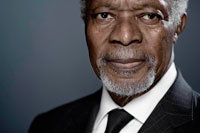Sunday Times 2
Former UN chief Kofi Annan dies aged 80
Former UN Secretary-General Kofi Annan has died at the age of 80 after a short illness. Mr Annan spent his final days at his home in Geneva, Switzerland, with his wife Nane and children Ama, Kojo, and Nina. He was the first black African to become UN Secretary-General, a role he held between 1997 and 2006.
 Mr Annan was the chief architect of what became known as the Millennium Development Goals, and played a central role in creating the Global Fund to Fight AIDS, Tuberculosis and Malaria and the UN’s first counter-terrorism strategy.
Mr Annan was the chief architect of what became known as the Millennium Development Goals, and played a central role in creating the Global Fund to Fight AIDS, Tuberculosis and Malaria and the UN’s first counter-terrorism strategy.
In 2001 the celebrated diplomat, who was born in Kumasi, Ghana, was a co-recipient of the Nobel Peace Prize with the UN for prioritising human rights in the role.
The committee also praised Mr Annan for his efforts to help contain the spread of the HIV virus in Africa as well as opposition to international terrorism.
Ghana’s national flag will fly at half-mast across the country for an entire week from Monday in tribute to Mr Annan.
‘Kofi Annan was a guiding force for good,’ current UN Secretary-General Antonio Guterres said today. ‘It is with profound sadness that I learned of his passing. In many ways, Kofi Annan was the United Nations. He rose through the ranks to lead the organization into the new millennium with matchless dignity and determination.’
Tributes have poured in for Mr Annan from across the world. Nana Addo Dankwa Akufo-Addo, the President of Ghana, paid tribute to Mr Annan on Twitter. He wrote: ‘The Government and people of Ghana, First Lady Rebecca and I are deeply saddened by the news of the death, in Berne, Switzerland, of one of our greatest compatriots, Mr. Kofi Annan.
‘He brought considerable renown to our country by this position and through his conduct and comportment in the global arena. He was an ardent believer in the capacity of the Ghanaian to chart his or her own course onto the path of progress and prosperity.
Mr Annan took on the top UN post six years after the collapse of the Soviet Union and presided during a decade when the world united against terrorism after the September 11 attacks.
‘I think that my darkest moment was the Iraq war, and the fact that we could not stop it,’ Annan said in a February 2013 interview with TIME magazine to mark the publication of his memoir. ‘Could you imagine if the UN had endorsed the war in Iraq, what our reputation would be like? Although at that point, President Bush said the UN was headed toward irrelevance, because we had not supported the war. But now we know better.’
Mr Annan’s uncontested election to a second term was unprecedented, reflecting the overwhelming support he enjoyed from both rich and poor countries – despite challenges from the outset. During his tenure as Secretary-General, Mr Annan presided over some of the worst failures and scandals at the world body, one of its most turbulent periods since its founding in 1945.
His enduring moral prestige remained largely undented, however, both through charisma and by virtue of having negotiated with most of the powers in the world. When he departed from the UN, he left behind a global organization far more aggressively engaged in peacekeeping and fighting poverty, setting the framework for the UN’s 21st-century response to mass atrocities and its emphasis on human rights and development.
After stepping down from his role in the United Nations Mr Annan set up the Kofi Annan foundation, a not-for-profit organisation that aims to promote better global governance. He also chaired The Elders, a group of elder statesmen founded by Nelson Mandela that promote global peace and human rights.
In his memoir, Annan recognized the costs of taking on the world’s top diplomatic job, joking that ‘SG’, for secretary-general, also signified ‘scapegoat’ around UN headquarters. As secretary-general, Annan forged his experiences into a doctrine called the ‘Responsibility to Protect’, that countries accepted – at least in principle – to head off genocide, crimes against humanity, ethnic cleansing and war crimes.
(© Daily Mail, London)

